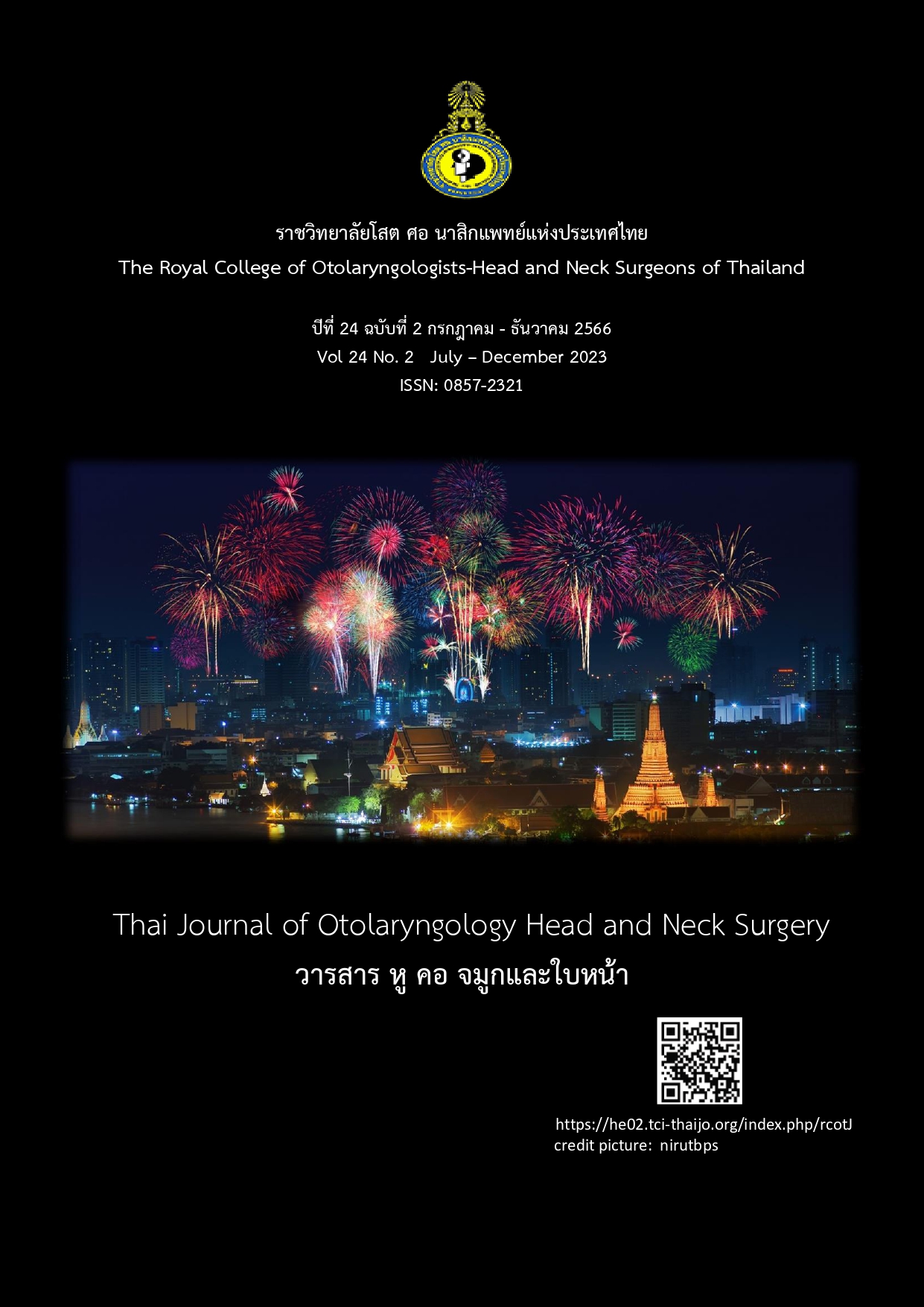Can Acupressure Reduce Symptom Severity and Drug Usage in Patients with Allergic Rhinitis?
Main Article Content
Abstract
Abstract
Background Patients with allergic rhinitis are increasing worldwide. Though treatment guidelines
have been provided, many patients remain with uncontrolled symptoms and search for add-on or
alternative treatments.
Objective: To explore the effect of add-on acupressure on the nasal symptoms of allergic rhinitis.
Methods: We performed pre- and post-treatment study in patients with allergic rhinitis. The
patients were instructed to apply pressure on five acupuncture points: 1 Yin tang, 2 Ying xiang, 2
He gu acupoints, as an add-on treatment. The acupressure was applied for ten seconds, followed by
massaging for ten seconds. The procedure was repeated five times for each point. The nasal symptom
scores, visual analog scale (VAS) scores, and peak nasal inspiratory flow (PNIF) were measured
before acupressure and two weeks after acupressure. At the last visit, they were asked whether
acupressure helped reduce their symptoms or drug usage.
Results: This study enrolled eight patients. The median age was 37.5 years (range: 19–74 years).
Further, seven (87.5 %) patients presented moderately severe persistent symptoms. There was a
significant improvement in the total nasal symptom scores (p-value = 0.012), VAS scores (p-value =
0.0018), and PNIF (p-value = 0.0287). At the end of the study, 75% and 25% of the patients reported
that acupressure reduced their symptoms and drug usage, respectively.
Conclusion: Through both subjective and objective assessments, two-week add-on acupressure can
reduce symptom severity in patients with allergic rhinitis.
Keywords: acupressure, complementary therapies, allergic rhinitis
Article Details

This work is licensed under a Creative Commons Attribution-NonCommercial-NoDerivatives 4.0 International License.
ต้นฉบับที่ส่งมาพิจารณายังวารสารหู คอ จมูก และใบหน้า จะต้องไม่อยู่ในการพิจารณาของวารสารอื่น ในขณะเดียวกันต้นฉบับที่จะส่งมาจะผ่านการอ่านโดยผู้ทรงคุณวุฒิ หากมีการวิจารณ์หรือแก้ไขจะส่งกลับไปให้ผู้เขียนตรวจสอบแก้ไขอีกครั้ง ต้นฉบับที่ผ่านการพิจารณาให้ลงตีพิมพ์ถือเป็นสมบัติของวารสารหู คอ จมูกและใบหน้า ไม่อาจนำไปลงตีพิมพ์ที่อื่นโดยไม่ได้รับอนุญาต
ตารางแผนภูมิ รูปภาพ หรือข้อความเกิน 100 คำที่คัดลอกมาจากบทความของผู้อื่น จะต้องมีใบยินยอมจากผู้เขียนหรือผู้ทรงลิขสิทธิ์นั้นๆ และใหร้ะบุกำกับไว้ในเนื้อเรื่องด้วย
References
References
Bousquet J, Khaltaev N, Cruz AA, et al. Allergic Rhinitis and its Impact on Asthma (ARIA) 2008
update (in collaboration with the World Health Organization, GA(2)LEN and AllerGen). Allergy 2008;
Suppl 86: 8-160.
Bousquet J, Schunemann HJ, Hellings PW, et al. MACVIA clinical decision algorithm in
adolescents and adults with allergic
rhinitis. J Allergy Clin Immunol 2016; 138: 367-74.
Bousquet J, Schunemann HJ, Samolinski B, et al. Allergic Rhinitis and its Impact on Asthma
(ARIA): achievements in 10 years and future needs. J Allergy Clin Immunol 2012; 130: 1049-62.
Brozek JL, Bousquet J, Agache I, et al. Allergic Rhinitis and its Impact on Asthma (ARIA)
guidelines-2016 revision. J Allergy Clin Immunol 2017; 140: 950-8.
Brozek JL, Bousquet J, Baena-Cagnani CE, et al. Allergic Rhinitis and its Impact on Asthma
(ARIA) guidelines: 2010 revision. J Allergy Clin Immunol 2010; 126: 466-76.
Pawankar R, Bunnag C, Khaltaev N, et al. Allergic Rhinitis and Its Impact on Asthma in Asia
Pacific and the ARIA Update 2008. World Allergy Organ J 2012; 5: S212-7.
Scadding GK, Durham SR, Mirakian R, et al. BSACI guidelines for the management of
rhinosinusitis and nasal polyposis. Clin Exp Allergy 2008; 38: 260-75.
Seidman MD, Gurgel RK, Lin SY, et al. Clinical practice guideline: Allergic rhinitis.
Otolaryngol Head Neck Surg 2015; 152: S1-43.
THAI JOURNAL OF OTOLARYNGOLOGY HEAD AND NECK SURGERY
Vol. 24 No. 2: Jul - Dec 2023
Hauswald B and Yarin YM. Acupuncture in allergic rhinitis: A Mini- Review. Allergo J Int
; 23: 115-9.
McDonald JL, Cripps AW and Smith PK. Mediators, Receptors, and Signalling Pathways in the
Anti-Inflammatory and Antihyperalgesic Effects of Acupuncture. Evid Based Complement Alternat Med
; 2015:
Albrecht T, Wu S, Baumann I, et al. Measurable impact of acupuncture on mucosal swelling
of inferior turbinates: a prospective, randomized, controlled study. Acta Otolaryngol 2015; 135:
-76.
Acupuncture: Review and Analysis of Reports on Controlled Clinical Trial By World Health
Organization 2002 ISBN: 9789241545433, 9241545437
Brinkhaus B, Ortiz M, Witt CM, et al. Acupuncture in patients with seasonal allergic
rhinitis: a randomized trial. Ann Intern Med 2013; 158: 225-34.
Feng S, Han M, Fan Y, et al. Acupuncture for the treatment of allergic rhinitis: a systematic
review and meta-analysis. Am J Rhinol Allergy 2015; 29: 57-62.
Xue CC, Zhang AL, Zhang CS, et al. Acupuncture for seasonal allergic rhinitis: a
randomized controlled trial. Ann Allergy Asthma Immunol 2015; 115: 317-24.
Yin Z, Geng G, Xu G, et al. Acupuncture methods for allergic rhinitis: a systematic review
and bayesian meta-analysis of randomized controlled trials. Chin Med 2020; 15: 109.
สมาคมแพทย์โรคจมูก. แนวทางเวชปฏิบัติ ส าหรับโรคจมูกอักเสบภูมิแพ้ในคนไทย (ฉบับปรับปรุง
พ.ศ.2565). Thai Journal of Otolaryngology Head and Neck Surgery 2022; 23.
Heatley DG, McConnell KE, Kille TL, et al. Nasal irrigation for the alleviation of sinonasal
symptoms. Otolaryngol Head Neck Surg 2001; 125: 44-8.
Takeuchi H, Jawad MS and Eccles R. The effects of nasal massage of the "yingxiang"
acupuncture point on nasal airway resistance and sensation of nasal airflow in patients with nasal
congestion associated with acute upper respiratory tract infection. Am J Rhinol 1999; 13: 77-9.
Israel L, Rotter G, Förster-Ruhrmann U, et al. Acupressure in patients with seasonal allergic
rhinitis: a randomized controlled exploratory trial. Chin Med 2021; 16: 137.
Liang Y, Lenon GB, Li M, et al. Feasibility of self-administered acupressure for allergic
rhinitis: a pilot randomized controlled trial and lessons learnt for future studies. Acupunct
Med 2022; 40: 142-51.
Ansotegui IJ, Melioli G, Canonica GW, et al. IgE allergy diagnostics and other relevant tests
in allergy, a World Allergy Organization position paper. World Allergy Organ J 2020; 13: 100080.
Holmstrom M, Scadding GK, Lund VJ, et al. Assessment of nasal obstruction. A
comparison between rhinomanometry and nasal inspiratory peak flow. Rhinology 1990; 28: 191-6.
Nathan RA, Eccles R, Howarth PH, et al. Objective monitoring of nasal patency and nasal
physiology in rhinitis. J Allergy Clin Immunol 2005; 115: S442-59.
Barnes ML, Vaidyanathan S, Williamson PA, et al. The minimal clinically important difference
in allergic rhinitis. Clin Exp Allergy 2010; 40: 242-


